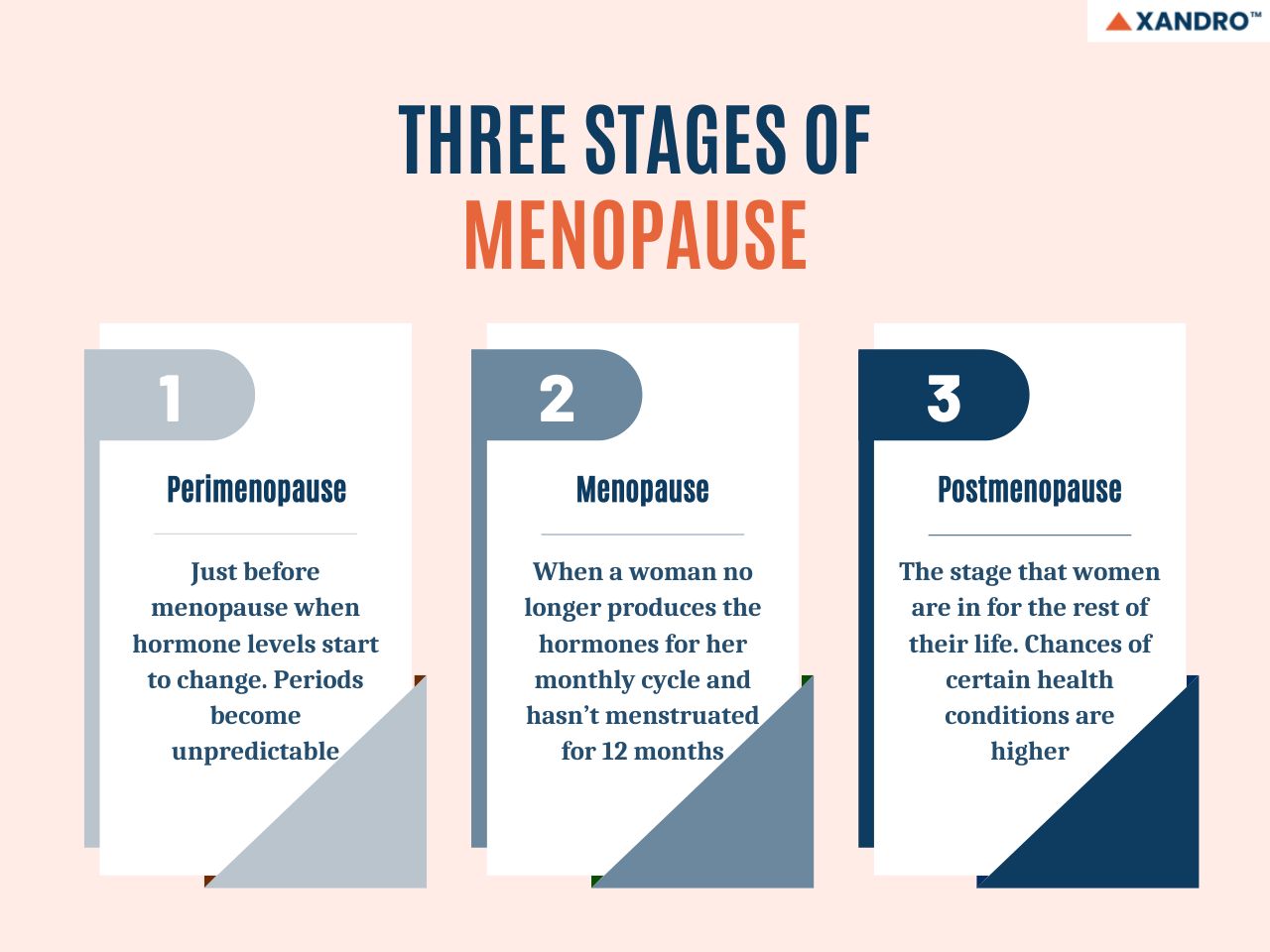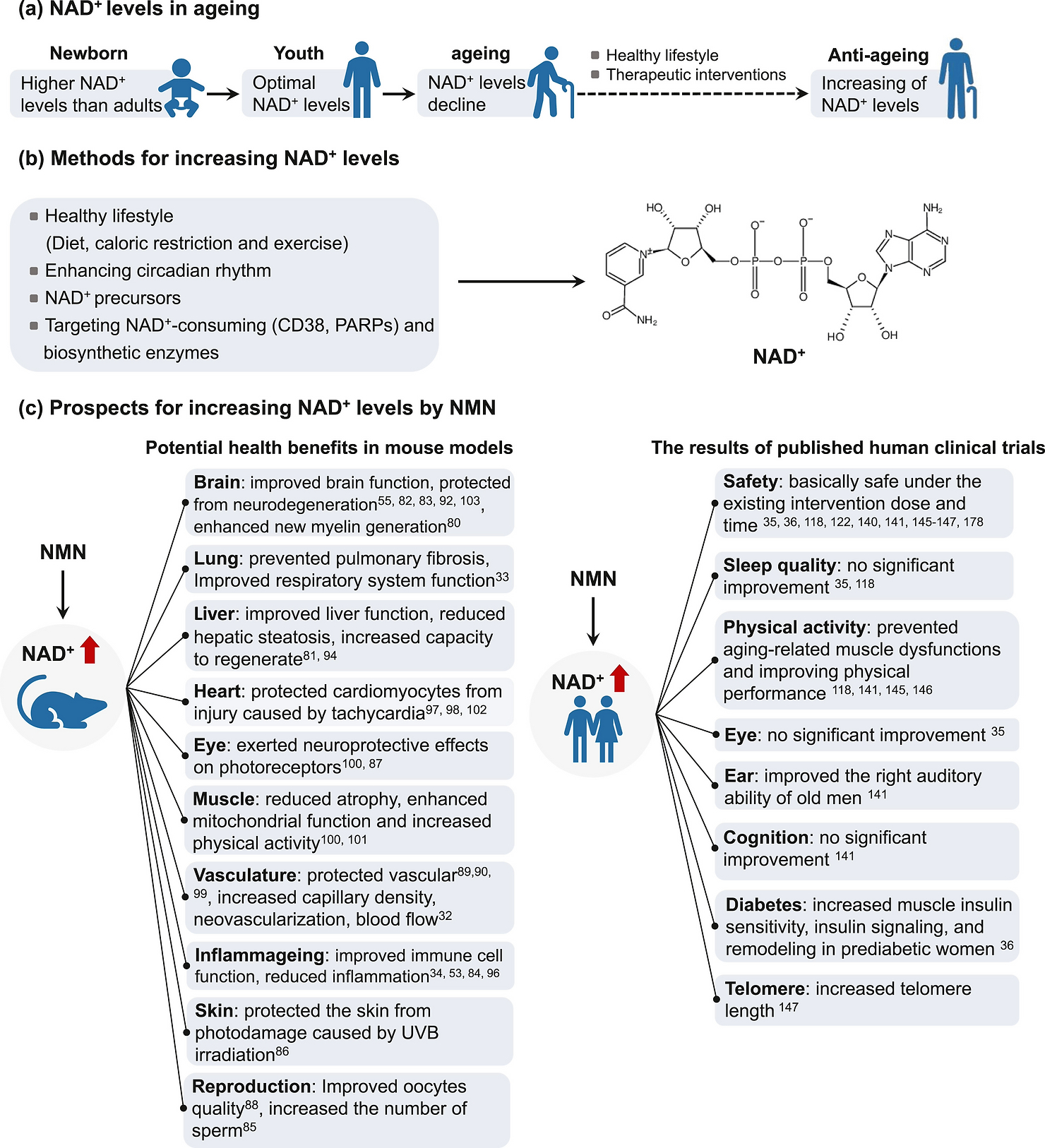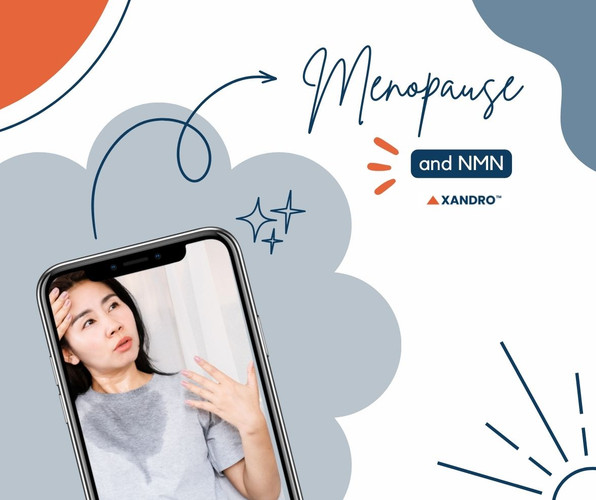Can NMN Supplements Help with Menopause?
11th Mar 2024
What To Know About NMN and Menopause
Women’s hormones fluctuate throughout their lives, such as through puberty, menstruation, pregnancy and breastfeeding, with the last huge hormonal shift in their life being the phases of menopause.
For women, there’s a correlation between aging and reproduction. It’s a known fact that the older we are, the lower the chance of getting pregnant, so let’s go through what happens during menopause and current research surrounding how NMN might help.
This post will cover a range of topics, including:
- What is Menopause?
- The Types of Menopause
- What Happens During Menopause?
- What is NMN?
- What Else Does NMN Do In Humans?
- Can NMN Help Hormonal Imbalance?
- Does NMN Increase Estrogen?
- NMN Side Effects
- How to Take NMN?
Menopause marks the end of the menstrual cycle, generally occurring between ages 45 and 55, although in some it can occur earlier or later.
When in menopause, the female body slowly stops producing eggs and the levels of estrogen and progesterone decrease. Due to the changes in hormones, the body goes through a range of both physical and emotional symptoms, including:
- Hot flashes
- Night sweats
- Mood swings
- Depression
- Vaginal dryness
- Sexual discomfort
- Changes in sex drive
- Insomnia
- Weight changes
- Dry skin
- Hair loss
- Urinary incontinence
- Increased risk of certain conditions, including osteoporosis and heart disease
Menopause is a huge change to a woman’s system and is an incredibly difficult time for women, but symptoms can be managed and health risks can be reduced with various treatments, such as hormone therapy, antidepressants, vaginal creams, medication for hot flashes and NMN.
Symptoms can also be managed through lifestyle changes, including:
- Regular exercise
- Meditation
- Eating foods rich in phytoestrogens, such as whole-grain cereals, flaxseed, chickpeas and legumes
- Reduce caffeine and alcohol intake
- Using water-based lubricant during sex
There are three types of menopause, each a different phase:
- Perimenopause: The period just before menopause where hormone levels start to fall. Periods can become unpredictable and menopausal symptoms may start to be felt.
- Menopause: When a woman no longer produces the hormones for her monthly cycle and has gone 12 months without menstruation.
- Postmenopause: The stage that women are in for the rest of their life, and where the chances of health conditions are higher.

A woman’s ovaries begin to produce less estrogen and progesterone which affects her body in various ways. It can change how a woman’s energy is used, where fat is stored and a higher chance of gaining weight, changes in bone and cardiovascular health, physical performance as well as appearance. Once they reach postmenopause, women can no longer get pregnant as their ovaries stop releasing eggs.
NMN is a derivative of vitamin B3 (niacin) and is a precursor of a nutrient in our bodies, called nicotinamide adenine dinucleotide, otherwise known as NAD+. NAD+ helps with cell function, such as the female reproductive system, and may slow down the aging process, but as we age, our body slows down its NAD+ production. NAD+ also helps activate sirtuins, including the SIRT1 gene, which helps control cell death, turn on and off anti-aging genes, help repair DNA and regulate our metabolism. This is why NMN is beneficial as it’s needed to increase our NAD+ levels.
- NAD+ booster, helping with anti-aging and longevity
- Boosts energy metabolism by producing adenosine trisphosphate (ATP)
- Improves cell health by repairing and regulating cells and DNA
- Might improve cardiovascular health, cognitive function, neuroprotection, increased insulin sensitivity (mentioned below) and metabolic regulation.
NMN is naturally found in fruits, milk and vegetables, such as avocado, broccoli, cabbage and tomatoes, although in small quantities.
NMN supplementation has been shown to have anti-aging benefits on female mice’s ovaries, with 0.5mg/mL a day helping reduce ovary aging, conserve eggs and improve the shape of ovaries.
This means that NMN may be able to help females reproduce for longer, possibly even reversing menopause.
It was also found to reverse insulin resistance in female mice with PCOS, helping restore their metabolic function. Due to this, they had reduced fat deposits, potentially an indicator of body weight improvement.
NMN treatment may also improve muscle insulin sensitivity in postmenopausal women who are overweight and have prediabetes. This was found in women ages 55 to 77 with a dose of 250mg for 10 weeks. More research is needed if there is a similar effect on young women, men, those with type 2 diabetes or those with poor kidney health.
Remember that since NMN can increase NAD+ levels, it may support an array of hormone functions that need NAD+ for optimal performance. For example, taking just 250mg of NMN each day may affect hormone processes that improve sleep quality.
Further Reading: A Guide to Maca Root Powder and how it may help with menopause.
No, NMN doesn’t increase estrogen in the body. It does, however, activate sirtuins, which help estrogen receptors become more receptive to the estrogen produced by the body, helping estrogen be used where it’s needed in the body, such as in the menstrual cycle and for influencing mood.
There is currently no evidence to suggest any negative side effects from taking an NMN supplement, as long as it’s stored in a cool environment, such as your fridge. When it’s warm or hot, it can degrade and poison your body.
Sometimes you might find that your body needs a slight break from taking NMN, which you can sometimes tell if you’re experiencing worsening sleep quality and poor memory. If this occurs, stop taking NMN for a week to give your body a break, then start up on it again.
A review of NMN clinical trials found it was safe to take between 250mg to 1,250mg of NMN for 4 to 12 weeks.
If asking, ‘Can NMN cause hot flashes,’ then you’ll be glad to know that even with high concentrations, NMN has not reported side effects of hot flashes. If you feel as though you’re experiencing side effects, lower your dosage and try taking it without caffeine for a couple of weeks until your body gets used to the NMN.
If taking NMN powder, take it in the morning with breakfast. Once you develop a tolerance for it, about two weeks, you can then take it about an hour before breakfast on an empty stomach for better absorption.
If you take NMN capsules, take them in the morning or at lunch to help with all-day energy.
NMN takes time to build up in your body, so be consistent to ensure you build up your levels. Consider taking a lower dosage and then raising this as you build up a tolerance.
Further Reading: The Benefits of Pomegranate Supplements and how they may help with menopause.
End Note
Keep in mind that more high-quality research on NMN supplementation is needed for humans. Human clinical trials are still underway. What the initial findings show, however, is that NMN is a promising supplement for a range of health issues, such as diabetes, cognitive decline and menopause, so it’s exciting to see what the research that is currently underway will find.
A 2022 review released a chart of NMN’s findings, comparing mice and humans:

It’s an interesting read and shows how promising NMN supplements may be for humans.
Looking to start taking NMN? Try Xandro Lab’s
NMN Powder or NMN Capsules, or read more research about the benefits of NMN!
